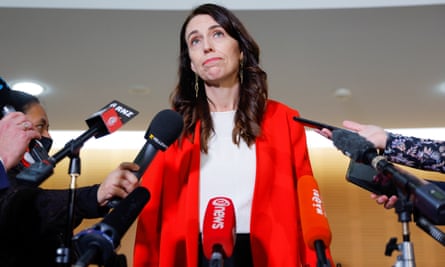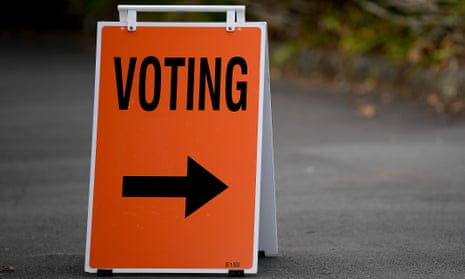Late in the campaign period of Auckland’s mayoral election came a spate of strange, oddly specific, billboard vandalism. As the race in New Zealand’s most populous city wound to its conclusion, boardings for Efeso Collins, an independent progressive candidate and mayoral frontrunner, were plasteredwith red “Labour” party logos.
Compared with the moustaches and monobrows that typically bedeck election billboards, it seemed an innocuous choice for vandals. But Collins’ campaign said it was an act of politicised sabotage. “None of our allies or volunteers have been doing it,” a spokesperson told The Spinoff. “We believe it’s an attack tactic.”
The idea that being branded, “Labour” amounted to an attack struck a curious note – suggesting that even progressive local campaigns saw association with the central government as a potential liability. This week, as results are finalised for New Zealand’s local body elections, races around the country have shown a consistent shift away from government-endorsed candidates, with most major centres shifting to the right. It’s a result that analysts say looks ominous for Ardern and Labour at the next election, expected to be called next year.
Collins in Auckland and Paul Eagle in Wellington both received the personal endorsement of Ardern, and both received a drubbing in mayoral elections. Collins, once a favourite to win, lost by a margin of 60,000 votes to conservative candidate Wayne Brown. In Wellington, Labour’s Eagle came in a dismal fourth place, securing less than half of the votes of Greens-backed winner Tory Whanau. In Christchurch and Dunedin, cities swung right, electing mayors more conservative than their incumbents.
The overall picture was of a lurch to the right in most major centres, and a pummelling for Ardern-backed candidates.
“It does lay a platform for the general election coming through this time next year as well,” Local Government NZ president Stuart Crosby told RNZ. Crosby said voters appeared to be reacting to a slate of long-term reforms – many driven by central government designed to increase housing density, build large public transport projects, upgrade infrastructure and create cycleways. “That is quite upsetting to a large number of people,” he said, and a “shift in political thinking” was “not to be unexpected” in response.
“The trend is towards a conservative reactionary movement across the country, probably in reaction in lots of places to housing density, increased cycling, that sort of thing,” says local politics commentator Hayden Donnell.
‘A ratepayer revolt’
The outcome of local body elections is by no means a one-for-one predictor of central races: cities often elect conservative mayors and liberal governments, and vice versa. Drawing conclusions from local outcomes is also hampered by low participation – just 40% this year – and a turnout that skews heavily whiter, older, and wealthier. But many of the issues that sprung up in the local races are also centre stage for the coming central election.
“It felt a bit like a ratepayer revolt,” says Max Rashbrooke, a writer on democratic participation and senior associate at the Institute for Governance and Policy Studies. “The people who traditionally think of themselves as ‘ratepayers’, which is the better off [members] of the electorate … feel that too much has been changing too quickly on housing intensification and cycleways, three waters, co-governance and things like that. And they expressed their displeasure.”

“I don’t think that this is a complete rejection of progressive politics,” says Donnell, noting that Wellington’s rejection of the Labour-backed candidate took a swing left. “I think that the progressive vote … is disillusioned with how incremental the changes have been, and how their lives are not really meaningfully better than they were three, six or nine or 12 years ago. So you have these two things: you have an energised conservative movement, and you have disillusioned progressive counter-movement. And so you’ve got real gains for the conservative reactionaries across the country.”
Those are local frustrations that he believes could also play out in central government races, with the left frustrated by slow or nonexistent progress on issues like the housing crisis, climate change, and mental health, while the right is cohering around opposition to infrastructure reform, co-governance with Māori, and slower economic growth.
Recent polling in New Zealand has for months shown the Labour party struggling to form a government. In September, the Labour party had a slight rise in support, up 1% to 34% of the total vote. But even combined with likely coalition partners the Green party, on 9%, and the Māori party, on 2%, the left would fall short of being able to form a government.
The right bloc, made up of the centre-right National party, on 37%, and Libertarian Act party, on 9%, could form a government without needing additional coalition partners. Polling on overall optimism – whether people “think the country is going in the right direction” and its economic outlook have also tracked down, as the government struggles to reign in inflation, housing unaffordability and high costs of living.
Part of the picture that could be emerging locally, Rashbrooke says, is a disillusionment with some of the government’s bigger political promises – where results are either not yet visible, or progress is slow.
“It felt like a vote against ambition. People, politicians who were promising change or had a big vision for things haven’t done particularly well, and it feels like there was a strong vote for small targets, low ambition, promises of getting the basics right,” he said.
“Voters can become very skeptical about parties’ promises. And I think the local elections are a sign that that effect may be kicking in.”
Asked whether the results spelled trouble for the party in the upcoming election, Ardern said they had little to do with central government results. “I’ve never interpreted local government elections in that way,” she said.
“They just have a different rhythm to them. I don’t think it’s fair to just necessarily draw those straight comparisons. In my mind, always there’s been times when central and local government have had different positions on issues – but actually, these are also times when we need to work together.”
